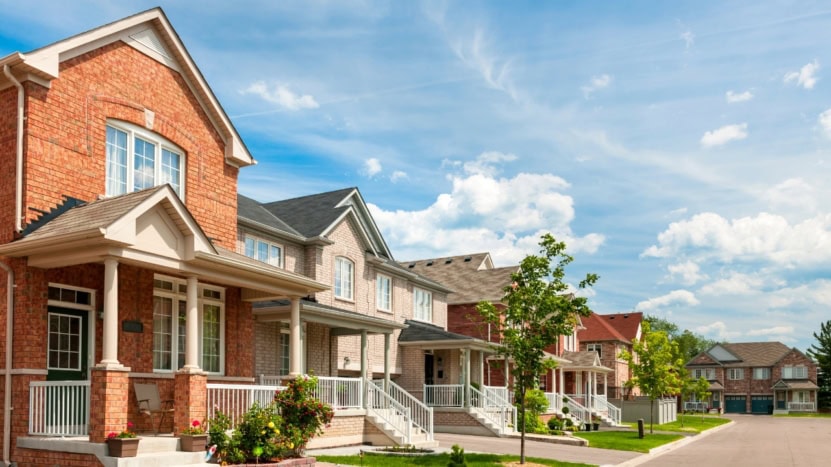Are you wondering if you can buy a house after bankruptcy? While it comes with its challenges, notably rebuilding credit and navigating waiting periods for mortgage qualifications, it is certainly achievable.
Bankruptcy, while a setback, is designed to provide a fresh start, freeing you from overwhelming debts. If you’re considering homeownership post-bankruptcy, whether it was Chapter 7 or Chapter 13, there are pathways to success. It should be noted that these same rules also apply if you want to just refinance your mortgage after a bankruptcy.
How Soon Can I Buy a House After Bankruptcy?
The timeframe for buying a home after bankruptcy largely depends on the mortgage type and the specifics of your bankruptcy. Generally, you might wait from one to four years. For instance, a Chapter 7 bankruptcy requires a two-year wait for an FHA loan or four years for a conventional mortgage from the discharge date. However, these periods can be shorter if you can demonstrate extenuating circumstances.
In addition, if you have a substantial down payment of 35% to 40%, you will be able to finance a home purchase immediately after your bankruptcy discharge. And if you pay cash for a home, there is obviously no waiting period at all.
How Does Bankruptcy Affect My Ability to Buy a House?
A bankruptcy impacts your credit both by lowering your credit scores (often significantly) and by simply showing up as a “bankruptcy” on your credit report. Low credit scores can be improved with secured cards, and careful attention to making on-time payments and maintaining low balances relative to your credit limits.
The bankruptcy record itself, however, cannot be eliminated and it will stay on your record for up to ten years. When lenders see your bankruptcy on your credit report, they will enforce waiting periods no matter what your credit scores look like in most cases. Exact waiting periods and credit score requirements are set out below.
What Types of Mortgages Can I Get After Bankruptcy?
Once you’ve fulfilled the necessary waiting periods, several mortgage options become available:
- Conventional Mortgages: The waiting period after a discharge is typically four years for Chapter 7 and two years for a Chapter 13 discharge.
- FHA Mortgages: These loans are more forgiving, requiring only a two-year waiting period after a Chapter 7 discharge, and only a one-year waiting period after a Chapter 13.
- VA and USDA Loans: These loans are as forgiving as FHA, with very similar waiting periods as well.
Exceptions: Exceptions to the above waiting periods are possible if borrowers can prove that their bankruptcies were one-time events that were exceptions to the rule and completely beyond their control, e.g., a natural disaster destroys a borrower’s business, but she had perfect credit up to that point. The other major exception is that Chapter 13 allows borrowers to obtain mortgages while they are IN a Chapter 13 bankruptcy, before it is even discharged – discussed in more detail below.
Understanding Different Mortgage Types and Their Bankruptcy Requirements
Navigating the world of mortgages post-bankruptcy can seem daunting. Different loan types have varied requirements regarding bankruptcy, which can influence your approach to buying a home. Here’s a detailed look at some common types of mortgages and their specific bankruptcy stipulations:
FHA Loans After Bankruptcy
The Federal Housing Administration (FHA) offers loans that are typically easier to qualify for due to their lower minimum credit score and down payment requirements, among other things.
- Chapter 7: You must wait two years from the date of discharge before obtaining an FHA loan. However, this waiting period can be reduced to one year if you can prove extenuating circumstances led to the bankruptcy.
- Chapter 13: As mentioned above, FHA only requires a one-year waiting period after a Chapter 13 mortgage is discharged.
VA Loans After Bankruptcy
Veterans Affairs (VA) loans are an excellent benefit for veterans and active military members, offering no down payment and no private mortgage insurance.
- Chapter 7: The VA requires a two-year wait from the date of discharge. Like FHA loans, this can be shortened with proof of extenuating circumstances.
- Chapter 13: Applicants who have made timely payments and received court approval may qualify one year after starting their repayment plan.
FHA and VA Loans DURING a Chapter 13 Bankruptcy
FHA and VA also allow borrowers to obtain mortgages while they are IN a Chapter 13 bankruptcy, as long as they have made at least twelve timely payments to the bankruptcy trustee and met several other conditions. This blog – Getting a Mortgage While In Chapter 13 – sets out all of those conditions, which apply to both refinances and purchase money mortgages.
USDA Loans Following Bankruptcy
United States Department of Agriculture (USDA) loans are intended for homebuyers in rural areas and offer 100% financing.
- Chapter 7: There is a three-year waiting period post-discharge, though this can be waived with documented extenuating circumstances.
- Chapter 13: You can qualify for a USDA mortgage one year after a Chapter 13 discharge. And similar to FHA and VA, you can also qualify for a USDA mortgage while you are IN a Chapter 13 bankruptcy if you meet specific criteria and get court permission.
Conventional Mortgages Post-Bankruptcy
Conventional loans, not backed by a government agency, adhere to the guidelines set by Fannie Mae and Freddie Mac.
- Chapter 7: Typically, you must wait four years after discharge or dismissal. If the bankruptcy was due to extenuating circumstances, the waiting period might be reduced to two years.
- Chapter 13: The waiting period is two years from the discharge date or four years from the dismissal date. If extenuating circumstances are documented, these periods can also be reduced.
Hard Money and “Non-QM” Loans Post-Bankruptcy – The Exceptions (No Wait Periods – IF You Have 35% to 40% Equity)
Hard money loans are also known as private money loans, as these loans do not come from institutions like commercial banks or mortgage banks.
They instead come from individuals, consortiums of individuals or from private funds – and they focus much more on the equity in your property than they do on your credit or income. As a result, these loans are available for borrowers right out of bankruptcy if they have 35% to 40% of the purchase price for a down payment, or equity cushions of a similar size if borrowers are looking to refinance.
Non-Qualified Mortgages or Non-QM Loans are loans that are outside of the regulatory guidelines associated with FHA, VA and conventional mortgages. These loans are also available for borrowers right out of bankruptcy if they have substantial down payments or equity.
Both hard money and non-QM loans also come with much higher interest rates and fees.
How to Choose the Right Mortgage After Bankruptcy
When choosing the right mortgage post-bankruptcy, consider your financial situation and how each type of loan aligns with your recovery and homebuying goals:
- Evaluate Loan Features: Understand the differences in down payment requirements, interest rates, and loan terms between FHA, VA, USDA, and conventional loans.
- Consider Your Financial Recovery: Assess your credit score, financial stability, and readiness to take on a mortgage. Ensure you have rebuilt a solid credit foundation post-bankruptcy.
- Professional Advice: Consult with mortgage professionals and possibly a bankruptcy attorney to make well-informed decisions that fit your unique circumstances.
What Should I Do to Prepare for Buying a Home After Bankruptcy?
Preparing to buy a home after bankruptcy involves several proactive steps:
- Credit Repair: This is the most important step and it will be discussed in more detail below.
- Gather Documentation: This includes W-2s, pay stubs, tax returns, and, importantly, bankruptcy discharge papers.
- Letter of Explanation: Prepare to provide this to potential lenders, detailing the circumstances of your bankruptcy and the steps you’ve taken towards re-establishing your credit and financial stability.
- Consult an Experienced Lender: There are many nuances and pitfalls involved in qualifying for a mortgage after a bankruptcy, making it crucial that you get advice from a lender with substantial experience in the bankruptcy realm.
Credit Repair After Bankruptcy
Repairing your credit post-bankruptcy is probably the most important step in securing a mortgage after bankruptcy. This process involves a variety of actions designed to rebuild your credit and improve your credit history and scores. We discuss the primary steps required below.
Understanding Your Current Credit Status
Start by obtaining a free copy of your credit report from the three major credit reporting agencies—Equifax, Experian, and TransUnion. Review these reports meticulously for any inaccuracies or outdated information that could be negatively impacting your score. Dispute any errors you find directly with the credit bureau.
Timely Bill Payments
Your payment history is the most significant factor affecting your credit score. Ensure that all your bills are paid on time, including utilities, rent, and credit cards. Setting up automatic payments can help you avoid missed payments.
Consistent, on-time payments can show lenders that you’re managing your finances responsibly post-bankruptcy. More importantly, a single late payment after a bankruptcy could delay your ability to obtain mortgage financing by months or even years.
Reducing Debt-to-Income Ratio
Your debt-to-income ratio or DTI ratio is the total of your monthly debt obligations (including your full housing payment) divided by your gross income. You want to ensure that it remains as low as possible by keeping your monthly debt obligations as small as possible, while also rebuilding your credit. While a low DTI will not directly improve your credit, it will make your applications for additional credit or a mortgage much stronger in the eyes of creditors.
Obtaining and Using Secured Credit Cards Wisely
Secured credit cards are a key tool for re-establishing credit. They are simply credit cards that require cash deposits that are equal to your credit limits, and they are available to most borrowers after a bankruptcy. Borrowers should use these cards to make small purchases as much as possible while also maintaining small or minimal balances. Once again, borrowers should be mindful to make timely payments every month.
Increasing Credit Age
While you can’t speed up time, being patient and maintaining long-standing credit accounts can benefit your credit score. The age of your credit history contributes to your overall creditworthiness. If possible, keep older accounts open, even if you don’t use them often, to increase the average age of your credit accounts. While this is often difficult after a bankruptcy, retaining any credit accounts that survived your bankruptcy is important.
Minimum Number of Accounts
Mortgage lenders like to see a minimum of three credit accounts. If none of your credit relationships survived your bankruptcy, you should establish at least three new accounts with secured cards or small installment loans.
Diversifying Your Credit Mix
Having a mix of credit types—such as a car loan, a secured credit card, and a personal loan—can positively impact your credit score. Lenders like to see that you can handle various types of credit responsibly. However, only take on new credit if it’s absolutely necessary and you are sure you can manage it effectively.
Avoiding New Hard Inquiries
Usually, when you apply for credit, a “hard inquiry” shows up on your credit report and it can lower your credit score. Limit applications for new credit to necessary inquiries and strategically time these applications to minimize their impact on your score. The impact of these inquiries does diminish over time, so excessive caution is not warranted.
Continuous Monitoring and Adjustment
Monitor your credit score and report regularly to track your progress and adjust your strategies as needed. This will also help you stay aware of any potential issues or inaccuracies that might appear in your report.
Frequently Asked Questions
Can you buy a house while in chapter 13?
As discussed above, you can buy a house while in Chapter 13 bankruptcy. You will need to meet a variety of criteria and get explicit permission from the bankruptcy court. As a reminder, it’s crucial to have maintained a record of on-time payments under your repayment plan. This demonstrates to mortgage lenders that you are managing your current financial obligations responsibly.
Can I buy a house after filing Chapter 7 bankruptcy?
Yes, but you will need to wait for your bankruptcy to be discharged, and then re-establish your credit and meet the waiting period requirements for most loans. But, as discussed above, you will not need to wait at all if you have a large enough down payment – in the 35% to 40% range.
How long after filing for bankruptcy can I buy a house?
The waiting period after filing for bankruptcy depends on the type of bankruptcy filed and the mortgage type you are applying for. Generally, Chapter 7 filers may need to wait up to four years for conventional loans, but as little as two years for FHA or VA loans, depending on the circumstances surrounding the bankruptcy.
How high does my credit score need to be to qualify for a mortgage after my Chapter 7 or Chapter 13 bankruptcy is discharged?
FHA mortgages only require a score of 580, and they will even allow for lower scores on occasion if there are compensating factors like very low debt ratios, large down payment, or a very strong explanation behind the bankruptcy. Hard money lenders will also allow for lower scores if you have a down payment in excess of 35%.
How long must I wait to buy a house after Chapter 13 bankruptcy?
Typically, you can qualify for a mortgage as soon as one year after your Chapter 13 bankruptcy is discharged. You can also qualify for a mortgage while you are IN a Chapter 13 bankruptcy if you have made twelve timely payments to your trustee and met a variety of other criteria, as discussed above.
ally, you can qualify for a mortgage as soon as one year after your Chapter 13 bankruptcy is discharged. You can also qualify for a mortgage while you are IN a Chapter 13 bankruptcy if you have made twelve timely payments to your trustee and met a variety of other criteria, as discussed above.
Which mortgage type is best after bankruptcy?
It depends on your individual situation, including military service (VA loans), purchasing in rural areas (USDA loans), needing flexible credit requirements (FHA loans), or needing to purchase a home without waiting periods (Hard Money loans).
Are there mortgages available with no waiting period after bankruptcy?
Hard money and non-QM loans do not require waiting periods if you have large down payments or substantial equity (for a refinance) in the 35% to 40% range. More traditional mortgages all have wait times, but they can be shortened in many cases if you can show that your bankruptcy was due to extenuating circumstances that were beyond your control.
How can I prove extenuating circumstances for bankruptcy?
Document the circumstances that led to your financial decline, such as medical bills, divorce, natural disaster, or job loss, and provide this evidence to your lender. It is essential that you prove that these were one-time events, that were beyond your control, that will not repeat. You will also have to show that you re-established and back on your feet financially.
Your Next Steps
As you navigate the complexities of buying a home after bankruptcy, it is crucial to partner with a knowledgeable and supportive lender with substantial bankruptcy experience. JVM Lending understands the intricacies of post-bankruptcy homeownership.
With a commitment to guiding you through every step of the mortgage process and a comprehensive range of loan solutions, JVM Lending can help you transition from bankruptcy to buying your own home. While the journey may require patience and careful financial management, the dream of homeownership is well within your reach with the right support.
If you’re ready to explore your homebuying options or simply need more information about getting a mortgage during bankruptcy, contact JVM Lending at (855) 855-4491 or email [email protected].
























